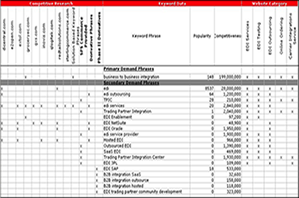 Numerous companies start blogs to better connect with customers (but often through a narcissistic lens). In most cases, Public Relations departments manage social media and blogging for companies which is great for promoting key messages and distributing information. That’s the Push side of PR. But the Pull is often overlooked.
Numerous companies start blogs to better connect with customers (but often through a narcissistic lens). In most cases, Public Relations departments manage social media and blogging for companies which is great for promoting key messages and distributing information. That’s the Push side of PR. But the Pull is often overlooked.
Most corporate blogs are not only boring, but they’re disappointingly difficult to locate on search engines. Key messages, voice and timing are considered, but keywords to drive search traffic are not.
Numerous PR practitioners have approached me after I’ve given a SEO for PR presentation and mention that they’ve never thought of, or just don’t know how, to include search keywords in the copy. Here are a few, simple tips I’ve followed for years here at Online Marketing Blog that companies can follow to increase search traffic and visibility to corporate blog content.

1. Research a Keyword Glossary – Whatever the target audience for your corporate blog is, journalists, customers, employees, partners, analysts, investors or others – they ALL use search. Use a keyword research tool to build out a keyword glossary of topics that are in demand. Share that glossary with content creators as a reference when planning, creating and publishing content online – including blog posts.

2. Create a Blog Content Plan – Starting a blog is easy. Sustaining a blog over years is not. Get into the habit of creating a structured, yet flexible content plan for your company blog. Decide that some days will follow a format and others are wildcards. Then assign keyword/topics to the planned articles, tips, interviews, surveys, liveblogging, company news, curated industry news and other content types. Most importantly, tap into feedback mechanisms like comments, keyword search traffic, off-post citations, social sharing metrics and links to make sure you’re on-track.
3. Include Keywords in Posts – There have been numerous how-to’s on optimizing pages but to sum up optimized blog post writing, follow these guidelines: Find a balance of optimizing for readers and search engines. Omit one and you lose the other. Do both well, and you will boost relevant search traffic and engagement.
Include keywords in the title tag of the post. The first words of the title matter most. Write a title that is more focused on the reader (feel free to use puns, metaphors or be ironic) for the On-Page Title. For Example:
On-Page Title (Focus: Readers) – 10 Ways to Create a More Engaging Facebook Page
Title Tag (Focus: Search Engines, Social Sharing) – Facebook Marketing: 10 Tips on Better Fan Pages
This is how the blog post writer can express their creativity by using compelling headlines and still provide literal titles with prominent keywords for search engines which do not understand puns or metaphors. If you’re using WordPress for your corporate blog, then the All in One SEO Plugin will provide the functionality mentioned above.
4. Use Descriptive References vs. Pronouns – Personal pronouns “I,” “you,” “she,” “he,” “it,” “we,” “you,” “they” and objective pronouns “me,” “you,” “her,” “him,” “it,” “us,” “you,” and “them” have their place in great copy, but search optimized content requires more descriptive references. For example, which of the phrases below do you think is more descriptive and useful for both readers and search engines?
“It is particularly effective when they use it with the products from company XYZ.”
“Social Media Monitoring software from company 123 is particularly effective for Social Media Strategists when used in combination with products from company XYZ.”
5. Use Keywords in Links – When following a content plan, it is inevitable that more than one post will touch on a particular keyword topic. It’s important to provide readers and search engines with descriptive links to older posts. Such links should use keywords as the anchor text (blue underlined text). I’ve already done this several times in the post above.
Using keywords in anchor text gives readers an indication of the topic they’ll see if they click on the link. The same keywords give search engines a very important signal too, which can help improve how the page appears in search results.
The anchor text can also be pointed at pages off your website to share keyword “link juice” elsewhere. For example:
“TopRank Online Marketing provides digital marketing services that helps companies attract, engage and convert more new business.”
There are other places to use keywords in coprorate blog posts (or any blog post for that matter) like the URL, the tags associated with the post, the categories it is placed in and image alt text. Those are standard SEO guidelines for a web page. They apply to blog posts too.
The key takeaway is to achieve mastery over keyword topics that are in demand as well as creative copywriting so that your corporate blog is both easily discovered via search engines and more useful for the people reading it.
If you’re responsible for writing a corporate blog, are you actively employing SEO and keyword best practices? Have you developed your ability to write for both readers and search engines?


